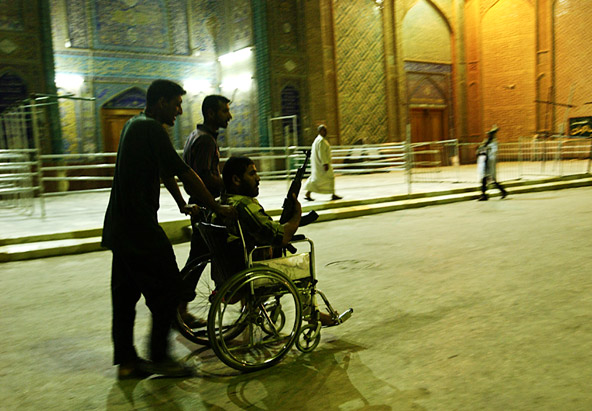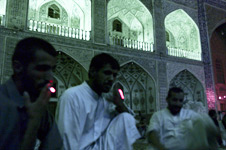
Najaf, Iraq, 17 August 2004. An injured Mahdi fighter patrols the southern gates of the shrine of Imam Ali during the three week siege by U.S. and Iraqi government forces.
Photo: Thorne Anderson, Corbis.
We heard things all the time. "You know, force is the only thing the Arabs understand." The man goes on, "Well, maybe Saddam was right to run the place with an iron fist. I mean look at these people, look at how they live." The guy laughs, drinks his beer. The Abu Ghraib torture photographs are all over the news in every country in the world. "Now, Ahmed, for god's sake bring some ketchup." The only thing to do was to find a table far from the mercenaries and pray they would get drunk where they were.
When an attack finally came, it wasn't a mortar. It was a car bomb positioned near the hotel checkpoint that missed the Australian ambassador, but killed a ten-year-old cigarette vendor named Ali. When the bomb went off fifty yards from the Duleimi hotel, the hallways filled with dust and the windows were blown into the rooms. When I opened the door, the hallway stretched away in a long cloud. I thought something was wrong with my eyes. On another floor a woman was screaming. We ran outside and, since there was nothing else to do, we watched the car burn. Later that day, a funeral procession for Ali made its way through the Jadriya neighborhood. The boy's house was only a few feet from where he was killed. His family wrapped the body in white for martyrdom while Ali's mother screamed at Bush for doing this to her son.
Everyone had their theories about the Iraqis. A skinny kid in the First Infantry Division told me that summer, "Hell, if it makes sense, Hajji don't do it. But he's getting pretty smart now. He's turning those PVC tubes you see all around here into launchers. I'm saying you gotta watch Hajji real close." Hajji, the honorific for older men or men who have made the pilgrimage to Mecca, is a term for the enemy.
"You know what Hajji means right?" I asked him.
"Yeah. We like to call 'em Hajjis."
We were on a First Cavalry base in Sadr City, and the soldier pointed at some Iraqi workers milling around the store. "See those guys over there, they are probably spotting for the mortar teams on their cell phones. Shit, here comes another one." There was the cartoon descending whistle, the mortar hit near the command center. We huddled in the doorway of the aid station while shrapnel cut through the air. The guys laughed when more mortars came screaming down near the aid station from across the river, and they looked at me as if to say, See what we go through, buddy?
During evening prayers, we listened to the imams broadcast bloody sermons, howling that the occupier was an enemy of God. A few weeks later, those same soldiers of the 1-5 Cav would be sent down to Najaf, into the vast necropolis with its million tombs, firing rounds at Mahdi Army positions next to the shrine walls. We were only a few hundred feet apart during the siege, on opposite sides of the lines.
I was sitting by the pool in the warm evening air when Cho brought me a beer. He sat down next to me and said, "I have a good contact in Sadr City. Maybe he's the best one."
"Sure. I have contacts there too, Cho."
"Yes, but this one is different."
"They are all different."
"No. This guy is a really powerful guy, I call him Little Saddam, as a joke."
"Who is he?"
"He's a journalist but he's more than a journalist. You can meet him if you want, I will arrange it."
"Tomorrow?"
"Tomorrow."
We drank our beers and I forgot about everything and then walked to the Dulaime hotel, the moldering wreck where second-rate Iraqi drivers waited for customers in its threadbare lobby. When kidnappers freed up most of the fourth floor, a wire report called it the "Eerie Dulaime" suggesting that it was cursed. French TV crews came out to investigate. We loved the place. It was a kingdom of stories and near misses. Because the rates were cheap, stringers and freelance photographers filled its rooms. Hamza Dulaime, the sheikh's son, would give freelancers a deal if he saw long-term prospects. When I was broke, Hamza waited for the money, "Don't worry about it," he said to me. This generosity, a willingness to discuss matters, is an Arab trait. It saved us. There were four filmmakers, a few writers, a gang of photographers. We left our doors open, friends stopped by with news, resistance contacts dropped by for coffee. In the hotel, we were all spied upon and cajoled, given incredible information. At night, when the resistance was gone and the work was done, we got high and watched images of burning cars on the BBC. We turned the sound off, replaced it with Led Zeppelin.
I took the elevator to the third floor to room twenty-five. It had windows that looked out over Jadriya Street, a pink linoleum dance floor, sharkskin-green furniture, a balcony from which one could possibly escape. From the street-facing windows I watched Apaches hunt for mortar teams down in the palm groves. These men would fire volleys of mortars at the Green Zone and disappear. At six in the morning, the dull thumps of bombs going off under American patrols woke us up.
Fatah al Sheikh
At nine the next morning, I met Cho and we drove to the edge of Sadr City to meet his special contact, Fatah al Sheikh. When we arrived at his office in a small Internet cafe. Fatah, hoarse and barrel-chested, was on the phone arranging something. He talked about how he had just come back from Iran, showing us a photo album of snapshots taken with various officials. Fatah standing in front of an automated printing press. Fatah staring at the camera in front of a fountain. Fatah talking to a mullah. This man promotes himself, I thought. He gets around. Our first meeting lasted half an hour and I learned nothing, but he learned a few things about us. While he was out of the room, his lieutenants asked me what country I was from, the name of the paper I worked for, going over and over the same questions. "Do you have another job besides journalist?" a man named Basim wanted to know. I said no and explained that I was from Ireland. A lie. I didn't know who they were.
 LEAD IMAGE: 17 August 2004, Najaf, Iraq. Young followers of Moqtada al Sadr inside the shrine of Imam Ali during the siege.
LEAD IMAGE: 17 August 2004, Najaf, Iraq. Young followers of Moqtada al Sadr inside the shrine of Imam Ali during the siege.Photo: Thorne Anderson
© Phillip Robertson, 2009-2020.
